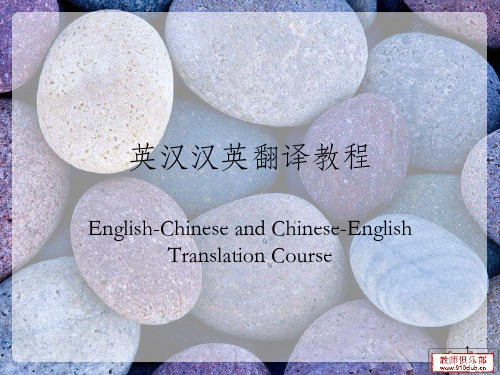4、我谨代表全公司,感谢你所做的所有工作。 On behalf of the entire company, I would like to thank you for all your work.
4、我们特别强调搞好售后服务。
We lay special stress on the importance oБайду номын сангаас offering good follow-up service.
5、采用这种新装置可以大大降低废品率。
The adoption of this new device will greatly cut down the percentage of defective products.
第五、六章 词类的转换和语序的变换
一、词类的转换 词类转换是汉英翻译中的重要手段之一,运用得
当,可以使译文通顺流畅,符合英语习惯。反之, 译文则会变得生硬累赘。常见的词类转换现象: 1、汉语动词转换成英语的名词; 2、汉语动词转换成英语的形容词; 3、汉语动词转换成英语的介词或介词短语; 4、汉语动词转换成英语的副词; 5、汉语的名词转译为英语的动词; 6、汉语名词转换成英语形容词或副词; 7、汉语的形容词或副词相互转换或转换成英语的 名词,介词或介词短语;
3、他有个女儿,在北京工作,已经打电话去了,听说明天 就能回来。 He has a daughter, who works in Beijing. Someone has phoned her and it is said will be back tomorrow.
4、那只老狼从灌木丛里窜出来,惊魂未定地喘息,伸出舌 头。它扭头望着那片灌木林,声响渐渐消失了,慌乱中 毫无目的地转了一阵。它累极了,便卧在地上。然后它 又坐起来,可是它突然像被咬了一下似地跳起来,那只 猛禽的铁爪还留在它身上。(周涛,《猛禽》) The old wolf runs out of the bush, still badly shaken, panting with its tongue lolling. It turns its head to look back at the bush; the terrifying sound has all but died out. Still in panic, it limps aimlessly for a while, then, exhausted, it crouches down to rest, As it sits up, a biting pain hurts its back: the eagle’s iron-like claw is still attached to its body.





